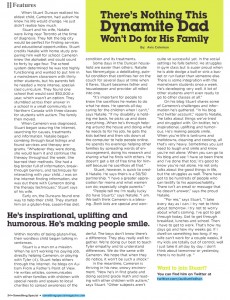Since getting involved in the autism community, particularly with my blog, I’ve gained a little extra attention simply for the fact that I’m a father. I knew, going in, that fathers speaking out was a rarity but I really had no idea just how rare. And while I enjoyed being given a little extra oomph to my voice by people willing to help get fathers heard a little more, I also kind of felt that I shouldn’t be taking it because… well, it’s really not fair. My voice was new, not yet established and even I wasn’t sure if I should be reaching a wider audience yet.
Still, as the years passed, I did get to meet some other fathers and I did get some more extra attention by those who were eager to hear from a dad for a change and started to feel more comfortable in my role… the autism father.
I was getting emails from other dads telling me how nice it is to hear that they’re not alone. Some of them even started blogs of their own. I was getting comments from moms telling me that they passed on something I wrote to their husbands and that they really liked it.
But this year… this year really takes the cake.
And I’m going to write now, a lot about me, but it’s not to gloat. Honest. It’s just that mine is the only perspective I have and don’t follow all of the mentions/articles/features that other dads have. But I will still highlight a few that I did notice.
Anyway, skip passed this next section if you want to get straight to the point because I am trying to make a point here.
A Father’s Point of View
This year, months ahead of time, I was contacted by Something Special Magazine because they wanted to feature a few “Dynomite Dads” for their June issue. It’s a magazine that distributes in only a few states but it’s growing and doing well and to be honest, for a guy sitting at home in a 10×10 room with no windows while my kids are playing, being in a print magazine is pretty awesome.
You can read the whole issue here or click on the thumb to the right to read the page that was about me.
A little closer to Father’s Day, I was contacted by Your Beautiful Child to be the guest featured father for Father’s Day morning. What an honour! And it really was a great show too, I think. Although the hour went by far too fast.
You can listen to my interview here.
On Father’s Day itself, I got mentions from fellow bloggers such as from Lou at Lou’s Land and also from resource sites including:
- Blogs around the web by dads of kids with autism
- Eight special needs dads that rock
- The Special Needs Week in Review: Father’s Day Edition
I even had a blog post of my own that was shared about quite a bit and another blog post of mine featured over at http://SpecialHappens.com as well.
The rise of the fathers
The point is, which I alluded to earlier, is that father’s are getting noticed and being heard. It’s not that no one would listen before but that we just never tried. Well, ok, some did but not enough. Not nearly enough. There’s still not enough but this proves that more and more dads are getting out there and speaking up.
This proves that more and more people like what we’re saying and want to hear more.
So yes, I shared mostly links to what I had going on but many of those links include more links to other fathers and to other resources with more fathers. Check them out!
Go find those dads… you might not agree with some, that’s to be expected. But some of them may have some very fresh perspectives which may really grab your attention.
And if you’re a dad and you see all these other dads out there, jump right in! Start your own blog, start commenting on other’s blogs, start up a Twitter account.. what ever.
Just, let us hear you. I’ve already proved that people want to.
If you’re still not convinced, check out this video from ABC where they talked to Lou from Lou’s Land… a father.
For more incentive, check out these other great dads:
- Lost and Tired
- Big Daddy Autism
- Run Luau Run
- Blogging Lily
- Both Hands and a Flashlight
- Look at my Eyes
Yeah, I’m pretty thrilled with the attention I got this Father’s Day. How can I not be? Still, the best part of the day wasn’t all the hoopla at all.
The day started with an email from a man in Florida who simply said that he read my story and now, no longer feels alone.
I can’t even begin to describe to you how great that feels. What a brilliant way to start the day!
Father’s Day is over now, but there’s a whole year to find more dads that are willing to speak up, to give more dads the attention they deserve and to make next Father’s Day even better.
It’s very exciting to me. I’ve seen so much change in so very little time.
Fathers, you rock!












